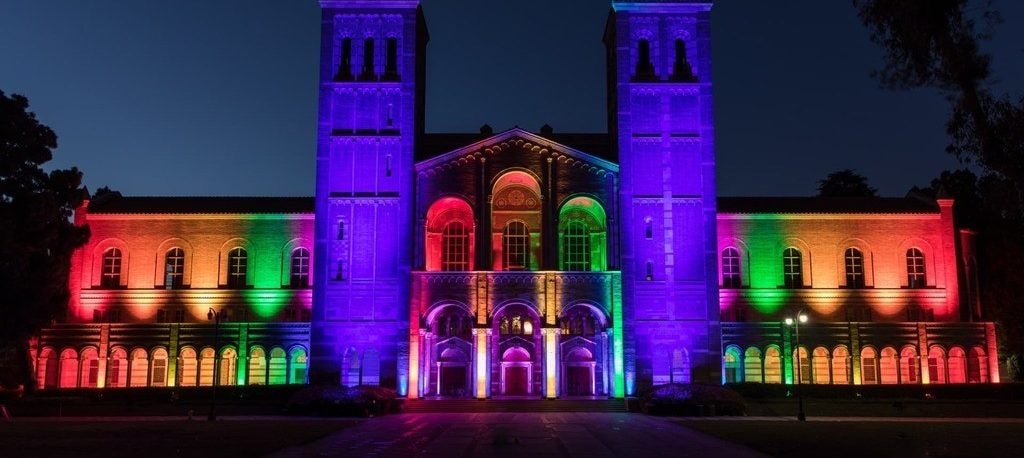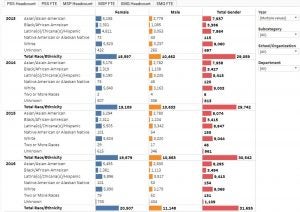Dear UCLA Community:
Every June people gather to mark Pride Month and to underscore the need to protect and advance the rights and inherent dignity of LGBTQIA+ people. While many celebrate with parties and parades, Pride also marks a painful past — the anniversary of five days of protest in June of 1969 after Marsha P. Johnson, Sylvia Rivera and others stood up to police officers who were arresting folks at New York City’s Stonewall Inn, a place where transgender people, gender nonconforming people, lesbians, bisexuals and gay men, many of whom were people of color, often gathered. In recalling this history, we are reminded of the need to uphold dignity and human rights for all. As Pride Month ends, let us ensure that our support for LGBTQIA+ communities continues every day of the year.
We are proud of the efforts of so many in our community to bring this vision to reality. UCLA has sponsored research in lesbian, gay, bisexual, transgender and queer studies for more than 50 years, longer than almost any other university in the United States. Thanks to the organizing, community building and advocacy of more than 20 LGBTQIA+ organizations at UCLA, including the Queer Alliance, BlaQue, Transgender UCLA Pride, and Queer and Trans in STEM, our students continue to be at the forefront in leading our institution to becoming more inclusive and affirming for LGBTQIA+ Bruins.
At the center of many of these efforts is the great work of UCLA’s LGBTQ Campus Resource Center, which recently recognized its 25th year on campus and is working towards its next 25 years by revising its mission and vision and by launching the LGBTQ Student Advocacy Committee and the Queer and Trans Black, Indigenous, People of Color (QTBIPOC) student experiences project. Guided by timely research and student advocacy, the Center provides community-building spaces, educational offerings, and direct support to students, staff and faculty through an intersectional social and racial justice framework. The center also provides allyship trainings for faculty and staff, including an upcoming summer session on how best to support LGBTQIA+ students.
UCLA’s Office of Equity, Diversity and Inclusion will be working to further support and advance such efforts through the UCLA Committee on LGBTQ Affairs and our educational initiatives, trainings and resources in support of UCLA’s LGBTQIA+ community. Vice Chancellor for Student Affairs Monroe Gorden and Vice Chancellor for Equity, Diversity and Inclusion Anna Spain Bradley will be working with the UCLA community to advance the implementation of the UC Presidential Policy on Gender Recognition and Lived Name and recommendations developed by the UCLA Gender Recognition Act Task Force regarding needed changes to our information systems, facilities, and educational opportunities to support transgender and nonbinary community members.
We also celebrate the contributions of all at UCLA who are advancing equity, diversity and inclusion for LGBTQIA+ people — such as those in the UCLA School of Law’s Williams Institute who are fighting anti-Black racism and those in the UCLA LGBTQ Studies program supporting teaching and research on the historical and contemporary experience of LGBTQ people.
This work continues. Join us in reflecting upon the wisdom of some in our community who shared their advice and reflections on what is needed and next.
“Uplifting the LGBTQ+ graduate population requires breaking down some of the isolation within departments, which makes it hard to find community, because they may be the only LGBTQ+ person in their program.”
– Hannah Friedman, Ph.D. student in Materials Chemistry, former student leader of Queer & Trans in STEM (QSTEM) and member of the UCLA LGBTQ Student Advocacy Committee
“Acknowledging other intersecting identities of LGBTQ+ Bruins and providing proper representation in different spaces is critical and helps students feel seen for their uniqueness.”
– Taylor Vassar, undergraduate statistics major and assessment and engagement intern for the UCLA LGBTQ Campus Resource Center
“It is critical to understand, both as faculty and students, our individual and intersections of our identities and how marginalization occurs in order to truly serve our campus communities in accessibility, accountability and acceptance.”
– Joy Iriye, undergraduate public affairs major and co-lead of the UCLA LGBTQ Student Advocacy Committee
“We must take a look inwards and ask ourselves in our roles, ‘How can I actively be an ongoing ally for and with LGBTQ+ Bruins?’ Start there, be a lifelong learner and reach out to the LGBTQ Campus Resource Center! We need each one of you to uplift the UCLA mission of true equity, diversity and inclusion.”
– Liz Lopez, program coordinator for the UCLA LGBTQ Campus Resource Center, she/ella/they/elle.
“The pandemic revealed the ways in which LGBTQ+ Bruins rely on the campus not just for an education, but to meet their basic needs while they are in school. Williams Institute research has shown that LGBTQ college and graduate students, in particular transgender students, were more likely to experience disruptions to their housing, jobs, and health during the COVID-19 pandemic than non-LGBTQ students. They also reported greater challenges in accessing classes remotely. In part, this is because LGBTQ+ students are more likely to live on or near campus and away from their families. They are less likely to have the support of family and friends to fall back on. To build back better, the UCLA campus needs to address the specific needs of LGBTQ+ and other economically vulnerable students who depend on the campus not just during pandemics, but throughout their education.”
– Brad Sears, founding executive director of the Williams Institute
Being a community requires building a community for all. Join us in supporting the LGBTQIA+ community at UCLA and beyond every day of the year.
Sincerely,
Anna Spain Bradley
Vice Chancellor for Equity, Diversity and Inclusion (she, her, hers)
Andy Cofino
Director, UCLA LGBTQ Campus Resource Center (he, him, his)






